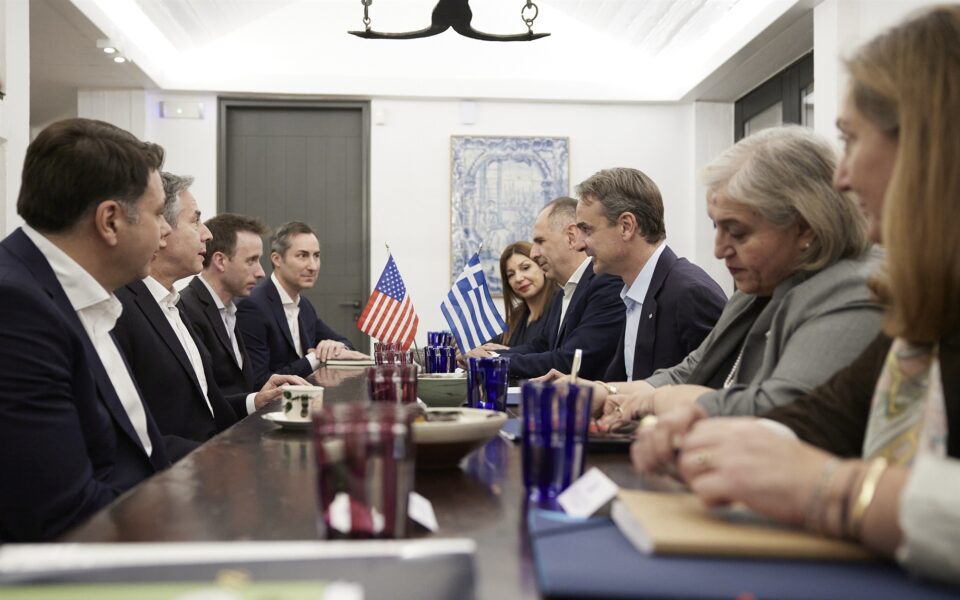The diplomatic backstory of the Hania deal and the condition on the Turkish F-16s

Athens appears to have extracted a commitment from Washington that the green light on the USA’s F-16 fighter jet sale to Turkey will be accompanied by a condition that they will not be used in offensive actions against Greece.
According to a behind-the-scenes agreement, US Secretary of State Antony Blinken is expected to send a letter to the leaders of the Senate Foreign Relations and House of Representatives Foreign Affairs committees making it clear that Turkey has pledged that the F-16s will not be used against any member of the NATO alliance.
A diplomatic source emphasizes that the Greek government preferred this method rather than including these assurances in Blinken’s letter to Prime Minister Kyriakos Mitsotakis.
“Such general statements in a letter to Athens are of little value,” a diplomatic source emphasized, stressing that “Blinken’s assurances to the powerful congressional committees are of much greater value, because it gives them the basis to stop the process of upgrading or selling the F-16s if Turkish aggression against Greece ever occurs. After all, there is the precedent where the F-35s sale to Turkey was blocked for reasons unrelated to Greece.”
This formula is the product of long behind-the-scenes negotiations with Greece and Turkey, largely shouldered by the US ambassadors in Athens, George Tsunis, and in Ankara, Jeff Flake. Tsunis was also responsible for negotiating with the Hellenic National Defense General Staff (GEETHA) to come up with a list of used weapons that the US could provide to meet some of the immediate needs of the Hellenic Armed Forces.
In addition to the F-35s, the list was to include two US Air Force C-130s, four littoral combat ships (LCS), as well as 62 Bradley Fighting Vehicles (excluding contingencies) and US Coast Guard patrol boats to be received by the Hellenic Navy, and four Island-class patrol boats, which it has already received.
The path clears
The US succeeded, albeit belatedly, in overriding the Turkish veto on NATO membership for Sweden by using the provision of F-35s to Greece as leverage against Ankara. The “ultimatum” to Turkey was that the delivery of the fifth-generation fighters would proceed regardless of the Turkish request for an F-16 upgrade, a request that would likely not be approved by Congress thereafter. It is worth noting that in addition to Blinken, US President Joe Biden himself used Greece as an argument in his conversation with Turkish President Recep Tayyip Erdogan on December 14.
‘Blinken’s assurances to the powerful congressional committees are of much greater value, because it gives them the basis to stop the process of upgrading or selling the F-16s’
The emergence of Athens as a regulating factor of US-Turkish relations demonstrates the systematic actions of the Greek-American lobby and its allies in Washington, who have raised the issue of Turkish aggression in the Aegean and linked the sale of US fighter jets to the need for safeguards, guarantees and further defense reinforcement of Greece.
According to analysts in Washington, DC, “for the first time ever, the sale of US weapons to a NATO member has been so difficult, met with so much resistance and ultimately been accompanied by asterisks as to their permissible use.”
From Hania
Greece was not on the original itinerary of Blinken’s recent grand tour. But the related recommendation was accepted without hesitation because another visit to Turkey within a few weeks without a corresponding visit to Greece would have a negative impact, not least in terms of communication. And this was something that the US administration wanted to avoid at all costs, especially at this particular moment when they felt exposed due to the constant postponements on the F-35s issue.
A stopover in Greece, even for a few hours, was considered extremely useful in the State Department, as it would give the US secretary of state the opportunity to reaffirm his relationship with Mitsotakis, to thank him for his understanding and his patience, and to ask him for a little more time “until the Swedish issue is resolved.”
Erdogan had assured him a few hours earlier in Istanbul that Sweden’s NATO accession protocol would be approved on January 16, as soon as the Turkish assembly opened. In Hania, Blinken wanted to make sure that he had the agreement of the Greek government to use this time frame as a last chance to resolve the complex issue.
Mitsotakis, recognizing the high stakes for the American side, agreed, and Blinken promised that regardless of other developments, the F-35s issue would be resolved before the prime minister’s trip to America. When it became clear that the January 16 deadline had been missed by the Turks, the Americans found themselves in an even more difficult situation, as the prime minister’s trip to the United States was approaching, during which, according to the agreement reached in Hania, he would have to have the letter of acceptance in his hands.
In an attempt to manage the difficult situation and to gain time, Blinken called Mitsotakis on Monday to tell him that “the Swedish issue would be closed on Tuesday” and that the approval of the F-35s sale would go ahead in a few days. This was followed by the cancellation of the Greek prime minister’s trip to the US, which inadvertently – but extremely conveniently for the Americans – eased the pressure from the Hania deal and gave the State Department some breathing space.
Indeed, the Turkish parliament ratified the Swedish accession protocol on Tuesday, but US diplomats immediately told Ankara that the official congressional notification could not yet be sent. As they told Turkish officials, “nothing is over until the accession process is fully completed.”
According to information obtained by Kathimerini, the Turkish president had told Biden during their telephone conversation in December that since he could not secure congressional approval in advance and since the procedures could not practically be carried out in parallel, he would have to find a way to clearly signal to the relevant lawmakers that it was the will of the US government that “the sale will go ahead as soon as Turkey does its part.”
In keeping with that agreement, and in an effort to make things easier for Erdogan, Biden sent a letter on Wednesday to the relevant Senate and House committees asking for the cooperation of lawmakers to move forward with the sale “without delay.”





